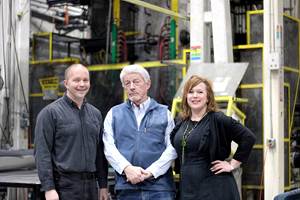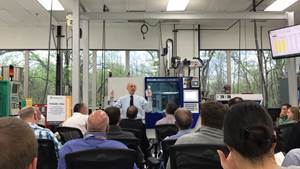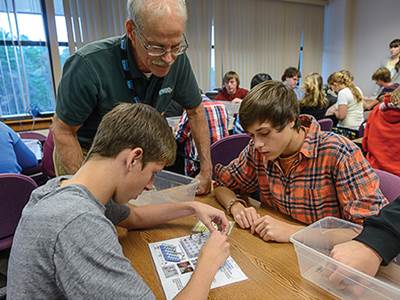Colorado Molder Joins First-in-the-Nation Skills Gap Initiative
A custom injection molder is at the center of an innovative partnership among businesses, governments and various organizations to not only better prepare job seekers for employment but also match their skill sets with companies’ pressing labor needs.
Noel Ginsburg, CEO of custom injection molder Intertech Plastics, Denver, Colo., joined Colorado Governor John Hickenlooper and representatives from LinkedIn, the Markle Foundation, edX and others to announce the launch of Rework America Connected. Colorado is the first state utilizing the new initiative, with Phoenix being the first city.
Speaking in Denver on June 23, Ginsburg noted that Rework America Connected is in some ways an expansion of efforts already underway in Colorado at Intertech and other companies, as well as a concerted drive to unite all those disparate programs.
“When I look back over our history,” Ginsburg said, “there's been one challenge that’s never changed—ensuring we have a capable workforce. That need has existed whether the economy was good or bad, and that tells me we're lacking something to connect people with the right jobs and the right education.”
Intertech, which runs 25 injection molding machines ranging in clamp force from 55 to 1500 tons, currently employees over 200, but Ginsburg admitted that the inability to find skilled workers when demand surged has cost has company anywhere from 10-15% in lost business (Plastics Technology covered Intertech’s training efforts, among others, in this special September 2014 report).
“The biggest challenge is having the right workers at right time,” Ginsburg said. “When I talk to colleagues around the country, that problem exists universally.” Rework America Connected is described as, “a partnership that will build on major initiatives already underway in Colorado and use new technologies and programs to better connect and support jobseekers, employers, and educational providers.”
Ginsburg said that with the support of the LinkedIn and the Markle Foundation, which is currently seeking to aid workers displaced by globalization and the technology revolution, Rework America Connected will create a “digital backbone” and “matching system” to help workers augment their skills in specific areas that employers are actually seeking.
Zoe Baird, president and CEO of the Markle Foundation, addressed the challenges that today’s workers are facing and how this initiative can help. “Our country and our state are going through the greatest economic transformation in 100 years,” Baird said, discussing the twin change agents of globalization and technology, which have impacted as much as 47% of American jobs. “It's been very disruptive for so many people. That disruption has been boing on for a while, but it’s only happening faster and faster.”
Governor Hickenlooper also touted the potential benefits of the new initiative as a bridge to a different kind of classifieds page. “This is really an investment in our workforce infrastructure,” Hickenlooper told the standing-room only crowd, noting that Rework America Connected represents a platform whereby participants can “really begin to define what the 21st century looks like in terms of a digital labor market.”
Hickenlooper said the project will allow Colorado to increase job placement rates, wage growth, and job retention, while helping job seekers “acquire the skills that will be most directly responsible for achieving their goals.”
Allen Blue, VP of product management at LinkedIn and the company’s co founder, said LinkedIn’s network of more than 300 million people, including 100 million Americans, will work to connect job seekers, educators, and employers. “LinkedIn envisions a world where we bring educators, employers and individuals together into one system where they can help each other,” Blue said.
Ultimately, Blue said he envisions a “single, shared language of skills and competencies” used by educators, job seekers, and employers. “We need to know what skills are required for a job; what skills a training program supplies; and what skills an individual has,” Blue said. “If you have all three, you can do matching. You let people see where gap is, and let them see where they can go to fill those gaps.”
Ginsburg saw the initiative as part of a broader rethinking of how schools, businesses and people interact. “This is going to take a real fundamental change in how businesses think about engagement,” Ginsburg said. “It won't be easy, but I think a lot of companies are already doing this. Anymore they realize that it's in their self interest to participate. We have a critical mass in the core of companies that are doing this right.”
Ginsburg drew a comparison to Germany, where that country’s apprenticeship system began hundreds of years ago and in some instances is funded and mandated by the government.
“That's not going to work here,” Ginsburg said plainly. “We need to meet the market where it’s at; create a system that's easy to access; and then prove it works.”
Related Content
Blow Molder with a Mission: CKS Packaging Shares Gains Of Its Phenomenal Growth
From three machines in 1986 to 27 plants nationwide today, this family-owned processor has prospered through unwavering customer service, committed employees and dedicated service to its community.
Read MoreBlow Molder Confer Plastics Celebrates Golden Anniversary & the ‘American Dream’
This family-run firm fills a specialized niche with a culture of innovation and environmental stewardship that realizes the dreams of its founders, its employees and its customers.
Read MoreLearn Fundamentals of Materials Handling in Self-Paced Online Course
Learn about equipment, procedures and maintenance for material handling related to injection molding.
Read MoreThe Experience Curve and Well-Trained Process Technicians
Pairing external big picture training with internal job-specific instruction can help your process technicians meet quality expectations as well as production targets.
Read MoreRead Next
What Processors Are Doing To Bridge the Skills Gap
Seasoned technicians are leaving, and replacing them with youngsters is a challenge. But some processors have taken dramatic initiatives to change how young people think about manufacturing and are bringing the next generation into the fold.
Read MoreBeyond Prototypes: 8 Ways the Plastics Industry Is Using 3D Printing
Plastics processors are finding applications for 3D printing around the plant and across the supply chain. Here are 8 examples to look for at NPE2024.
Read MoreLead the Conversation, Change the Conversation
Coverage of single-use plastics can be both misleading and demoralizing. Here are 10 tips for changing the perception of the plastics industry at your company and in your community.
Read More


























